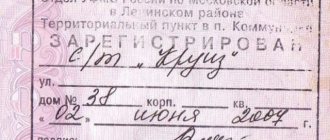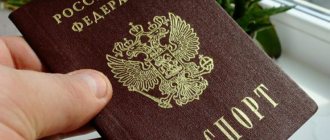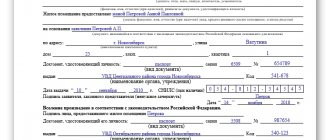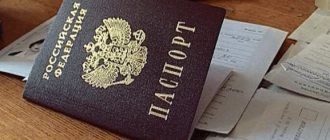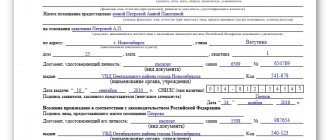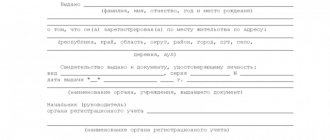Citizens certainly need to understand the terms found in regulations. Otherwise, a person simply does not understand what his rights and responsibilities are. A common case of confusion in deciphering concepts is the question of what differences exist between place of residence and place of registration. From this article you will learn what a place of stay and a place of residence are, what the difference is, how permanent and temporary registration differ, how to register correctly, what documents will be needed for permanent registration.
The concept of place of residence - what is a place of residence
Current Russian legislation allows citizens to move around the country as they please, however, there is a procedure according to which living outside a permanent place of residence is allowed for no more than 90 days - otherwise, they will have to contact the authorized bodies to obtain temporary registration at the place of residence.
So, a certain place in which a person is temporarily located for a period of time (less than 3 months without registration or more than 3 months with registration) is called the place of stay. This could be a hotel, a sanatorium-resort institution, a rented apartment, a recreation center, etc. Employees of enterprises such as hotels register visitors themselves, and in the case of rental housing, a person registers himself.
To inform the authorities that a person will temporarily reside in a place other than where he is registered on a permanent basis, you need to submit an application through the Main Department of Migration Affairs of the Ministry of Internal Affairs, the official website of the State Services or a multifunctional center. Employees of the institution will issue a certificate confirming the fact of applying for registration.
Article 20 of the Civil Code of the Russian Federation. Place of residence of the citizen (current version)
1. Paragraph 1 of the commented article defines the place of residence of a citizen. This is discussed in more detail in the Law of the Russian Federation of June 25, 1993 N 5242-1 “On the right of citizens of the Russian Federation to freedom of movement, choice of place of stay and residence within the Russian Federation” and the Rules for registration and deregistration of citizens of the Russian Federation at the place stay and at the place of residence within the Russian Federation, approved by Decree of the Government of the Russian Federation of July 17, 1995 N 713 (as amended on May 25, 2017) “On approval of the Rules for registration and deregistration of citizens of the Russian Federation at the place of stay and at the place of residence within of the Russian Federation and the list of persons responsible for receiving and transmitting to the registration authorities documents for registration and deregistration of citizens of the Russian Federation.”
Thus, according to clause 3 of these Rules, the place of residence is the place where a citizen permanently or primarily lives as an owner, under a lease (sublease), social tenancy agreement or on other grounds provided for by the legislation of the Russian Federation - a residential building, apartment, service residential premises, specialized houses (dormitory, hotel-shelter, house of flexible fund, special house for single and elderly people, boarding house for the disabled, veterans and others), as well as other residential premises.
The formal basis for recognizing a citizen as living in a certain place of residence is his registration at the place of residence (the place of residence should be distinguished from the place of residence. The place of residence is a hotel, sanatorium, rest home, boarding house, tourist center, hospital, as well as other residential premises where the citizen lives temporarily). However, state registration at the place of residence does not occur automatically.
As noted in the literature, a study of regulatory legal acts of the Russian Federation, constituent entities of the Russian Federation, local governments and judicial practice allows us to identify three key grounds for refusing to register citizens at their place of residence:
1) restriction of freedom of movement and choice of place of residence in certain territories of the Russian Federation that have a special legal status, where federal laws establish appropriate legal regimes, the main purpose of which is to ensure security (we are talking about border territories and closed territorial entities);
2) an indirect restriction of the right to freely choose a place of residence, arising from the methods of exercising the right to housing determined by housing legislation, since if the established requirements are not met, a citizen cannot obtain the documents necessary for registration at the place of residence, and, accordingly, register;
3) the citizen does not have residential premises or the citizen lives in a non-residential premises that is suitable for him to live in.
———————————
Mirolyubova S.Yu. Institute of registration of citizens at the place of residence and place of stay // Journal of Russian Law. 2011. N 7. P. 23.
The place of residence may not coincide with the place of registration at the place of residence.
The law connects the categories “place of residence” and “place of stay” with the presence of residential premises, which, in accordance with the Housing Code of the Russian Federation and the Civil Code of the Russian Federation, must meet certain requirements.
Thus, to determine the place of residence, the presence of residential premises and the right to reside in it are necessary. According to Art. 15 of the Housing Code of the Russian Federation, residential premises are recognized as isolated premises, which are real estate and are suitable for permanent residence of citizens (meets established sanitary and technical rules and regulations, and other legal requirements). The procedure for recognizing premises as residential premises and the requirements that residential premises must comply with are established by the federal executive body authorized by the Government of the Russian Federation in accordance with this Code. Also, the residential premises may be declared unfit for habitation.
In order for a room to acquire residential status, it must be isolated and suitable for long-term living. Within the meaning of the provisions of the Housing Code of the Russian Federation, a residential premises, if it is determined that it is unsuitable for long-term residence, loses its status as such.
The term “predominantly” means that we are talking about situations where a citizen has several residential premises in which he can live on the grounds stated above, and he can indicate to his counterparties the premises that he owns, but does not actually live there. Thus, the word “predominantly” means that he lives in one place or another more often than in other places.
An accurate determination of the place of residence is of important legal importance for protecting the rights and interests of citizens, ensuring the stability and certainty of civil legal relations. The Civil Code associates with it the onset of a number of civil legal consequences. For example, as a general rule, the place of performance of a monetary obligation is the place of residence of the creditor, and for other obligations - the place of residence of the debtor; the place of residence is associated with the recognition of a citizen as missing and the declaration of a citizen as deceased; place of opening of inheritance (Article 1115 of the Civil Code); jurisdiction when resolving disputes in an arbitration court and a court of general jurisdiction. State registration of an individual entrepreneur is carried out at the place of residence.
In this regard, if the wrong place of residence is reported, situations may arise that are unfavorable for either one or the other party to the civil legal relationship. Adverse consequences may include, for example, failure to receive subpoenas, which in turn may create the risk of negative consequences in the form of an unfavorable judgment.
The question of the status and place of residence of internally displaced persons and refugees, i.e. persons who left their place of residence not individually and not of their own free will, but involuntarily, due to unfavorable political, social conditions, natural disasters, as well as due to a real danger of being persecuted on the basis of nationality, race, religion, etc., regulated by the Law of the Russian Federation of February 19, 1993 “On Forced Migrants”.
2. Minors under the age of 14 and persons recognized as incompetent shall reside at the place of residence of their legal representatives - parents, adoptive parents or guardians. In other words, their place of residence coincides with the place of residence of their legal representatives.
Comment source:
“CIVIL CODE OF THE RUSSIAN FEDERATION. PART ONE. ARTICLE-BY-ARTICLE COMMENT"
S.P. Grishaev, T.V. Bogacheva, Yu.P. Sweet, 2019
The concept of place of residence - what is place of residence
So that citizens of the country can exercise their legal rights in the region in which they live, and also to know where a particular person lives on a permanent basis, a record of citizens is kept at their main place of residence. That is, the place of residence is the housing in which a person is constantly, most of the time. In such an apartment/house, this citizen must have permanent registration (a stamp indicating the presence of which is placed in the passport).
If a person moves to another area, he will have to be discharged from his permanent home and re-registered in the region where he is going. Permanent registration (until 1993 - registration) can be issued in residential premises such as an apartment, house, rented housing, dormitory, room, boarding school, service apartments.
Registration required
In addition to the fact that the legislation provides for a system of administrative penalties in the form of fines for late registration, citizens will feel the lack of registration in other cases.
The need for registration may arise in the following situations:
- for registration of marriages and divorces;
- to receive social and medical benefits;
- for secondary and preschool education;
- for registration as a taxpayer;
- for employment;
- to be able to fully dispose of your property and make any transactions with it;
- apply to judicial authorities, participate in enforcement proceedings;
- to accept an inheritance;
- for the implementation of individual entrepreneurship;
- to determine the place of residence of minor children and other incompetent relatives;
- for registration as needy and low-income residents;
- to be able to receive official subpoenas, summonses, etc.
It is important to know what liability is provided for violating the law on timely registration of your place of residence. For unregistered citizens - 1500-2000 rubles. And for persons who are owners with whom such a citizen lives, a fine of 2000-2500 rubles is provided.
But in order to prove the guilt of the homeowner, there must be documentary evidence that this citizen lived at this particular address. Such evidence may include lease agreements or other documentary evidence of a person’s actual residence.
Place of residence and place of registration, actual differences
The difference between place of residence and registration is as follows:
- place of stay is housing that is used by a person for temporary stay (for the period permitted by law), and there is a list of premises for temporary residence (these are recreation centers, sanatoriums, camps, etc.);
- place of residence is a residential premises in which a person is officially registered (until 1993 - registered), where he can be found at almost any time;
- place of actual residence - apartment/house where the citizen is actually located, despite the fact that he is registered in another premises.
About minors separately
Registration of minor children at the place of stay or residence of parents (adoptive parents, guardians) is carried out at the same address, regardless of the consent of the owners, tenants and members of their families.
Thus, if a citizen of the Russian Federation is temporarily registered in your living space, then he has the right to register his child with you without asking anyone’s consent.
Documents required for temporary registration of a minor child under 16 years of age at the parent’s address:
- parent's ID card;
- child's birth certificate.
Please note: despite the fact that a child 14–16 years old already has a passport, the rules state that registration at the place of residence with parents is carried out on the basis of the child’s birth certificate. And here everything is logical. A birth certificate proves relationship. The same documents must be provided for the child’s permanent registration.
Often, house management and passport offices, despite the regulations, require the consent of owners, tenants and members of their families. And in cases where a child is registered from one parent to another, the consent of the second parent is also required.
Place of residence and place of stay - differences between the concepts
Let's compare the definitions of the concepts of place of registration and residence and take a closer look at what the difference is:
| Comparison criterion | Location | Place of stay |
| Duration of stay | A citizen resides in the premises on a permanent basis | The person lives in the premises for a short period of time |
| Registration | The tenant himself applies to the authorized bodies for registration | Registration is carried out by employees of the institution (except for the situation with rented housing) |
| Type of residential property | Individual house, apartments, service housing, shelters, boarding houses, boarding schools, hostels, homes for the elderly. | Hotel, sanatorium, recreation center, rented apartment, hospital, housing for relatives. |
| Documents confirming registration | Stamp on ID card (passport) | Help (certificate) |
Deregistration
The procedure for deregistration consists of submitting an application by the temporarily registered person himself, or by the owner who provided him with housing. Registration is canceled in the following cases:
- The citizen notified the registration authorities of his relocation and registration in a new place in writing;
- The citizen was called up for military service;
- The citizen was convicted and imprisoned;
- The citizen is declared missing by a court decision;
- By court decision, the citizen was declared dead;
- The citizen was evicted due to the loss of the right to reside in accordance with a court decision;
- When registering, the citizen provided deliberately false information.
Important! According to the Administrative Code, citizens living without registration will be brought to administrative responsibility. Moreover, not only the persons living in the apartment will be held accountable, but also the owners of this apartment, who should have registered them.
Difference between permanent and temporary registration
A person obtains permanent registration in the housing where he lives permanently (the registration period is not limited), and temporary registration is needed if he stays in another place for a period exceeding 90 days.
Proof of permanent registration is a stamp on the front page of the passport, and temporary registration is an insert indicating the day of arrival and the end date of the time spent in the said premises. Permanent registration can be canceled only at the request of the tenant himself or by a court decision, and temporary registration ends automatically upon expiration of the period specified in the certificate.
Important! If the need arises, temporary registration is allowed to be extended - this is the only way to legally continue to stay in temporary housing for an additional period.
Temporary registration makes it clear to the authorized bodies that the citizen is at his actual place of residence. But permanent registration makes it possible to exercise more rights:
- to participate in the privatization of residential premises;
- to operate an apartment/house at will;
- to register a spouse, children, and relatives in the living space.
Differences between place of stay and actual residence
In order to determine the main differences between the place of stay and the actual place of residence, we highlight the main points. Features of the place of residence:
- A citizen resides permanently in one residential property. This object, as a rule, is the property of a citizen, or he lives there under a rental agreement concluded for a long term;
- Permanent registration is issued at this address;
- A citizen pays utilities at his place of residence;
- At the place of his registration, a citizen has the opportunity to prepare the necessary documents at government agencies;
- Having registration, citizens can receive medical and social services, as well as enroll their children in kindergartens and schools;
- Citizens have the right to register as entrepreneurs and engage in economic activities;
- Citizens have the right to go to court if necessary.
Important! If a citizen has issued a residence permit, it is valid permanently. When registering in an apartment or other residential property in which a citizen lives temporarily, it will be valid for the period determined with the owner of this housing, but not more than 5 years.
Features of the place of stay include:
- A citizen stays in a residential property temporarily; as a rule, this property is located in another city;
- Registration is required only if you stay in a given residential property for 90 days in a row;
- The temporary registration can be valid for up to 5 years, after which it is subject to re-registration;
- The citizen is not the owner of the home; if he wishes, the owner of the home has the right to evict the citizen at any time;
- A citizen has the right to use government services only while his temporary registration is valid;
- Utilities are paid by the owner;
- The document confirming temporary registration is an insert in the passport.
Thus, the main difference lies in the residence itself, as well as in the period of time that the citizen lives in it. Based on this, the format of registration is determined: temporary or permanent.
What documents are needed to obtain permanent registration?
Important! If a person decides to cancel his permanent registration (check out) to move to a new place of residence, he will have to prepare a certificate of absence of debts for utility services.
To register at your place of permanent residence, you must prepare a minimum package of documents, including:
- application for registration in residential premises;
- citizen's passport;
- a document confirming the existence of rights to move into an apartment/house (application from the owner of the property, an extract from a court decision, a certificate of ownership, a lease agreement).
Consequences of late registration of a citizen
The legislation of the Russian Federation clearly regulates the procedure for state registration of citizens, therefore the legal acts give exact deadlines for when an individual should register at a new place of residence.
So, in Art. 19.15 of the Code of Administrative Offenses of the Russian Federation states that if a citizen does not go through the registration procedure within seven days, then administrative liability is imposed on him. The sanction in this case implies a fine in the amount of 1,500 to 2,000 rubles.
In addition, the owner of the property may also be responsible for late registration at a citizen’s place of residence. In this case, the norm enshrined in Part 2 of Art. 19.15 Code of Administrative Offenses of the Russian Federation. A fine is imposed on the guilty person, the amount of which ranges from 2000 to 2500 rubles.
It should be remembered that the calculation of the 7-day period begins only from the moment the subject arrives at his new place of residence, and not upon deregistration from the previous registration. Due to ignorance of this nuance, many citizens fall for the tricks of the migration service, whose employees unlawfully draw up reports of administrative offenses.
If this happens, the citizen has the legal right to appeal to the authorized body to appeal such a decision. In particular, the application can be addressed to a higher authority or a court, but no later than 10 days from the date of receipt of the protocol.
Expert opinion on the question of how to register correctly
Employees of the Main Department of Migration Affairs of the Ministry of Internal Affairs explain the procedure for registering at the place of permanent residence and temporary stay - the procedure is extremely simple, since a person can often exercise the basic rights of a citizen only if he has registration.
Currently, registration can be completed by contacting a department of the Main Department of Migration Affairs of the Ministry of Internal Affairs, a multifunctional center (the MFC sometimes requires even fewer documents than the Main Department of Migration Affairs of the Ministry of Internal Affairs), or by sending an application through the State Services website (pre-registration with identification confirmation is required).
Registration is completed within 3-5 days, after which a person can pick up a stamped passport. As for temporary registration, this can be done by the owner of a rental home or an employee of a sanatorium, recreation center, hotel and other residential complexes.
Registration procedure
This procedure is established by the rules for registering individuals, which are mandatory for compliance not only by citizens, but also by registration authorities.
All movements of citizens within the territory of the Russian Federation are subject to state registration. This process is carried out by the migration service. The law establishes the obligation of citizens to register within 7 days of moving into a new place. In case of temporary stay in another locality for more than 3 months, a person is required to obtain temporary registration for the planned period of stay there.
The procedure for registering citizens is as follows:
- Collection of necessary documentation.
- Writing an application.
- Providing a complete package of papers to the registration authority.
- Obtaining a passport stamp or certificate if a person does not have a Russian passport.
The most difficult and time-consuming step is collecting the necessary documentation. The package of papers may differ significantly in certain cases. It depends on:
- who registers;
- who owns the premises.
The simplest option is to register the owner of your property. Then the following documents are required:
- personal passport;
- title papers;
- statement;
- if a person was deregistered in advance, then he must provide another departure slip.
In case of loss of the departure slip, the applicant can write an explanatory note as to why he does not have this slip. The absence of this document cannot be grounds for refusal of registration.
Similarly, a person can register in a non-privatized apartment, but on the condition that he has a rental agreement concluded in his name. Then this agreement is submitted as a title document.
A more complex package of documents is obtained when it is not the owner of the property who registers, but another person. In this case, when registering it, the consent of all owners of the property will be required if it is privatized.
If the residential premises are owned by the municipality, then registration will require obtaining the consent of all registered persons at this address, as well as permission from the municipality. In this case, approval can be given if family ties are confirmed and the mandatory availability of 10 square meters of living space for each registered citizen.
Common mistakes
Error: A citizen came to another region of Russia on business and plans to stay away from his place of permanent registration for six months. He did not obtain temporary registration.
Comment: If a citizen plans to live outside the place of permanent registration for more than 90 days, he needs to contact the Main Department of Migration Affairs of the Ministry of Internal Affairs and register at the place of temporary residence (actual residence).
Error: A hotel guest is going to register at his place of permanent residence at the Main Migration Department of the Ministry of Internal Affairs.
Comment: Employees of hotels and other places of temporary stay will independently take care of the registration of the guest.
Where to get it
A special state body, the FMS, is responsible for recording the location and movement of all citizens on the territory of Russia. Regardless of whether temporary or permanent registration is required, all documents are sent specifically to the territorial offices of this service.
There is a common electronic database of all registered citizens. Each time documents are submitted to change a person’s location information, changes are made to this database. Also, all information must be stored in paper archives.
In addition to the FMS office itself, documents can be submitted through:
- Passport Office;
- MFC;
- government services portal.
Submission of documents is also possible through a representative. But for this he must have a notarized power of attorney to carry out these actions. You can also send papers by mail. But be sure to have copies of all documents certified by a notary. When submitting an application online, you will need to go to the FMS office and put a registration stamp in your passport. For persons who do not have a passport, a certificate will be prepared for issue.
